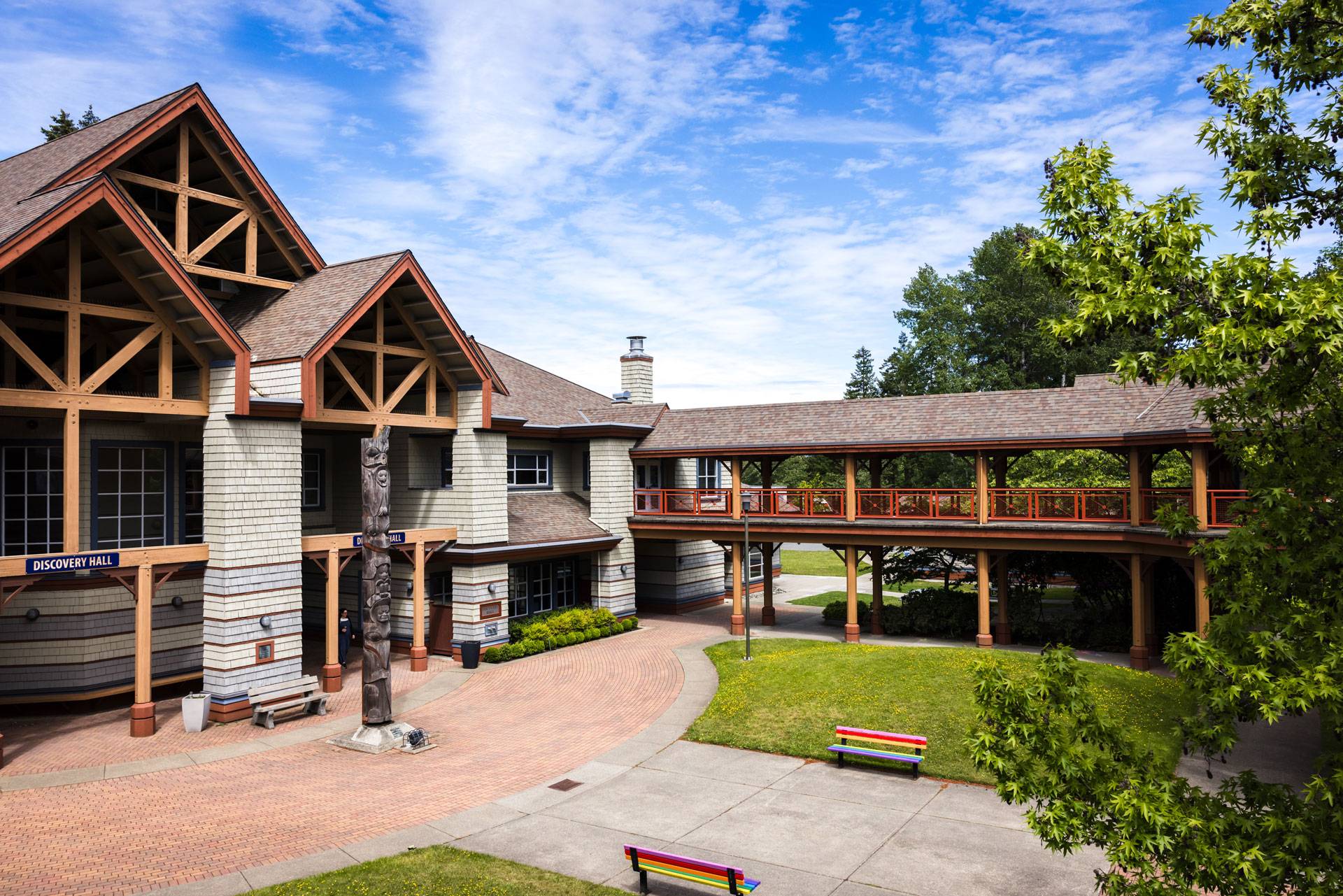The Martlet’s five biggest stories from the past 365 days

From left to right: February’s YPY protest, by Cormac O’Brien. Cannabis is legalized in October, by Belle White. UVic announces Finnerty will be replaced by Starbucks, stock photo accessed by Pixabay.
A near collapse of a prestigious literary journal, panic about a literal collapse, and the corporate takeover of campus food services were all news stories that dominated headlines in Victoria — and at UVic — in 2018.
As Canadian Literary Magazine the Malahat Review held an emergency meeting to decide its future, some Victorians hiked up mountaintops to avoid a potential emergency one morning in early January. Meanwhile, Canadian citizens young and old ramped up for Oct. 17, the day recreational cannabis was legalized country-wide.
As the year comes to an end and we prepare to usher in 2019, the Martlet is looking back at our top headlines from 2018.
Earthquake and Tsunami warning issued to Greater Victoria — Jan. 23
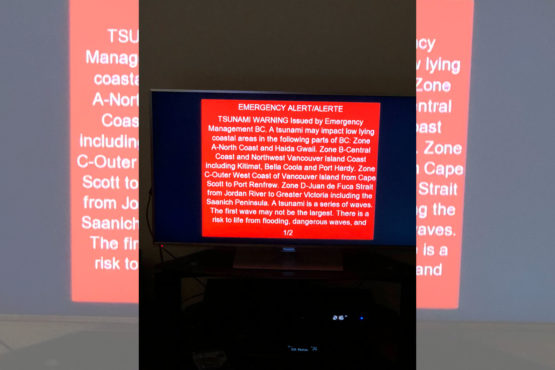
A photo of the tsunami warning broadcast in January. Photo by iSpeezy via the /r/VictoriaBC subreddit
In the early hours of a cold January morning, Cormac O’Brien, Volume 70 Editor-in-Chief, wrote a story high atop Mt. Tolmie about a tsunami warning after a 7.9 magnitude earthquake struck off the coast of Alaska.
O’Brien, surrounded by other worried Victorians who sought higher ground in the wake of the warning that had been relayed via Twitter, the CBC, and news channels on TV, wrote that at 1:40 a.m., the Government of Canada had issued a tsunami warning to the low-lying areas of Greater Victoria and the west coast of Vancouver Island.
Thankfully, our former editor scaled down Mt. Tolmie unscathed, and a few hours later, at 4:30 a.m., the warning was cancelled in Victoria and downgraded to an advisory for Tofino.
YPY Protests — Feb. 22
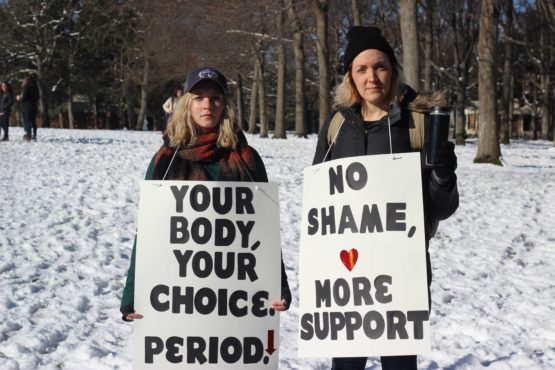
Counter-demonstrators came out against YPY’s flags, each of which represented 10 abortions preformed in Canada a year. Photo by Cormac O’Brien.
Youth Protecting Youth, a club on campus formed to increase awareness of fetal development and alternative options to abortion, staged a protest in the quad to represent the number of abortions performed in Canada each year.
In February, the club planted 10 000 pink and blue flags in the quad, each flag representing 10 abortions conducted in Canada per year. Two counter-protesting students were almost arrested for pulling the flags out. Saanich police told them they could be arrested for theft after they began taking the flags out of the ground.
No arrests were made, and by late morning, all the flags had been removed.
Uncertainty and turmoil around the Malahat Review — May/June
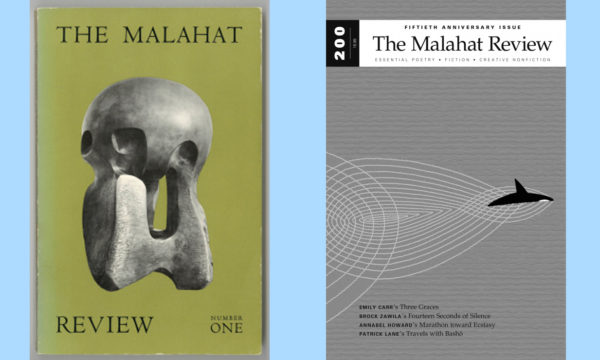
Provided photos of the Malahat Review’s first and 200th edition.
A meeting was called in May after John Barton, UVic alumnus and editor at the Malahat Review since 2004, resigned.
In searching for a new editor, the university decided to restrict the prospective replacements to only regular UVic faculty members, which drew criticism from Victoria’s literary community. Many thought the position should be opened up to candidates from the public. The university’s reasoning for restricting the position to faculty was for financial reasons.
“I felt concerned and dismayed at the possibility of a real loss,” former editor of Arc Poetry Magazine Anita Lahey told a crowd of about 40 community-members and UVic faculty who had gathered to discuss the issue. “A publication such as the Malahat is to Canadian writers what a respected scholarly journal is to its field of study. It’s a focal point, a testing ground, a catalyst, a laboratory, a professional community, and a hub.”
Dean of Humanities Chris Goto-Jones and Dean of Fine Arts Susan Lewis suggested a temporary three-year plan that will see the university create an endowment that should alleviate the journal’s debt in three years and allow the Malahat to hire for a longer-term position in 2021.
A month later, editorial board member and professor in the English department Iain Higgins was hired as the magazine’s new editor, a position he will hold for the next three years.
Cannabis is legalized — Oct. 17
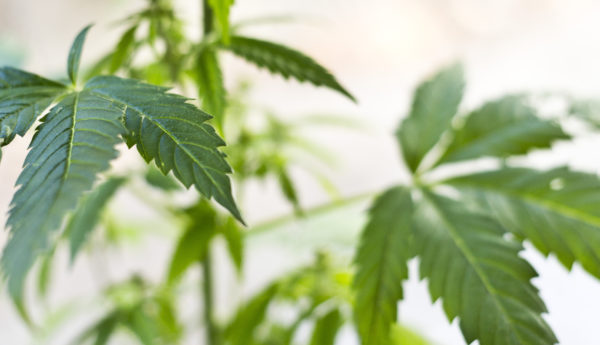
Photo by Belle White, Photo Editor.
Since Justin Trudeau was sworn in as Prime Minister in 2015, his campaign promise of federally legalized cannabis has hung in the air with no official legalization date. Until June, that is, when Trudeau confirmed that Oct. 17 would be the official (and long-awaited) cannabis legalization date. Provinces scrambled to figure out their own cannabis regulations as October seemed to sneak up on everyone much sooner than anticipated.
A group of provinces opted for privately-run stores, others decided upon government-only operations, and some, like B.C., decided to run a hybrid system where both government and privately-run establishments could set up shop.
Victoria has long been regarded as a very progressive city when it comes to cannabis regulation. Our feature with Alex Robb, General Manager of Trees Dispensary, uncovered some of the myths pertaining to cannabis on the Island.
Robb outlined the problems that smaller producers of cannabis, like the ones that Trees does business with, have faced and will continue to face with legalization. Micro-cultivators (what these small producers are called) had to deal with financial pressure and unrealistic time constraints before they could become officially recognized as a legal dispensary. Many are still experiencing issues with becoming a legally-recognized entity.
“The new NDP government [came] in and [lobbied] the federal government very hard that before they legalize, they need to create a way for the small-scale B.C. producers to get into the legal system,” said Robb a few days before legalization. “But the issue is that the applications for micro-cultivators won’t even be reviewed until after Oct. 17.”
Earlier in December, The Province uncovered that many small cannabis growers are still facing problems on the road to becoming recognized as legal entities. This issue will inevitably spill into 2019.
Starbucks replacing Finnerty’s — November/December
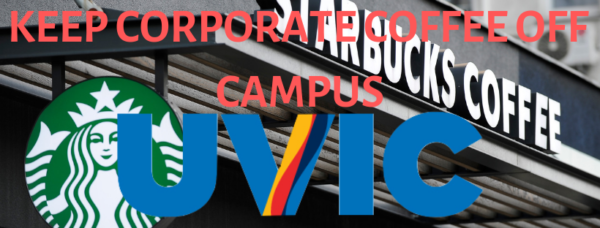
The photo that the Stop Starbucks UVic group is using for their Facebook page. Accessed via www.facebook.com/stopstarbucksuvic/
In November, it was announced that coffee chain giant Starbucks would be coming to campus and replacing Finnerty Express Café in the lower level of the Bookstore.
UVic had a long-time moratorium on third-party food chains starting in 2006 that only ended in 2016 with the introduction of Booster Juice and Bento Sushi.
The announcement means the end to Finnerty’s partnership with Salt Spring Coffee, the Café’s current bean supplier, as well as the end of partnerships with a number of local bakeries.
“Starbucks has the brand power to support and contribute to a more vibrant campus environment though extended hours on nights and weekends,” said Jim Forbes, Director of Campus Services.
Many students on campus were furious with the university’s decision to replace the local Finnerty Express for a giant chain, and a petition and Facebook page was created online in the wake of the news. To date, over 2 100 people have signed the petition and the Facebook page Stop Starbucks UVic has received 816 likes.
Starbucks will officially replace Finnerty in the fall of 2019, however questions about the consultation process remain unanswered. This story is still developing, with more coverage to come in the new year.




